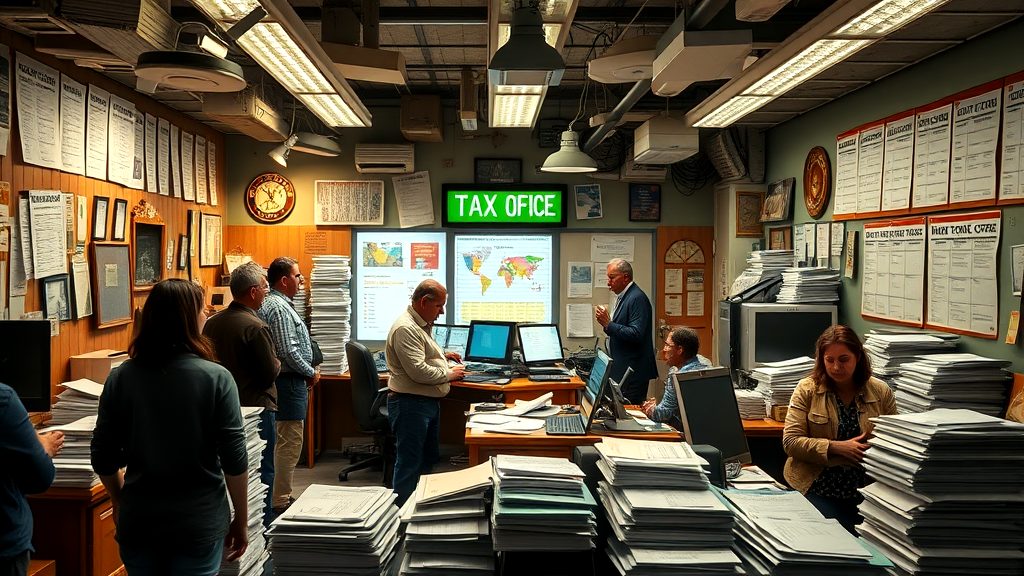Tax Lien Investing Tips for Beginners
Ready to dive into the world of tax lien investing? It’s a unique way to earn returns. When property owners don’t pay their taxes, you can step in. You’ll buy tax liens and earn interest when they pay up. Imagine owning a piece of the pie without buying the whole cake! But remember, it’s crucial to do your homework. Check out the property first. Not every deal is a gold mine. Watch out for hidden costs and conditions. Auctions are your playground for buying tax lien certificates. Whethaer online or in-person, each has its own set of rules. Be ready for some friendly competition!
Key Takeaways
-
Tax lien investing lets you earn interest on unpaid property taxes.
-
Property tax liens are auctioned off online or in-person.
-
Always research property conditions and neighborhood values before buying tax liens.
-
The tax lien sale process can vary by location, so know the rules.
-
Be ready to handle foreclosures and property management in your tax lien investments.
Understanding Tax Liens
Peeling back the layers of tax lien investing unveils a world full of potential. Property tax liens provide a unique chance to invest in real estate without direct ownership. But it’s not all sunshine and rainbows. This venture demands a sharp eye for detail and a knack for understanding local laws. Every tax lien sale brings its own flavor, shaped by jurisdiction and auction rules.
A humorous tale from a seasoned investor highlights this: He once won a lien on a “prime” property, later discovering it was a swamp! The moral? Always visit the property and dig deep into its history before jumping in.
For those curious about real estate and tech, my blog on AI in real estate offers fascinating insights.

What Are Tax Lien Certificates?
Peeling back the concept of tax lien certificates, they provide an exciting venture in the world of tax lien investing. When taxes on property go unpaid, municipalities issue these certificates, which detail the owed taxes and penalties. Investors swoop in during a tax lien sale to claim these debts, with the potential to earn interest if the homeowner eventually pays up. However, like an unexpected plot twist, each sale varies by jurisdiction, affecting how investors engage with these opportunities.
Curious about real estate trends, especially in states like California? I shared some insights on average home prices that might interest you. Investing in property tax liens can seem like striking gold, but it’s crucial to do your homework.
How Tax Lien Sales Operate
To grasp how tax lien sales function, imagine a lively auction scene. Here, investors bid on tax lien certificates issued for unpaid property taxes. These sales occur online or in person, depending on the location. Notably, some auctions favor investors with the lowest interest bids, while others highlight those who bid above the lien amount. The winner then claims the property tax liens.
This form of tax lien investing involves some risk, but offers a chance at great returns. Investors must pay the tax debt and manage it carefully. If the property owner doesn’t pay up, investors might get the property. Always research and understand the rules before jumping into a tax lien sale game.
Bidding Process at Auctions
Understanding how auctions operate is crucial in tax lien investing. Different municipalities have unique auction rules. Some base the winning bid on the lowest interest rate, while others focus on the premium above the property tax lien amount. Keep your eyes peeled and strategy sharp. Lower rates could mean less profit, but they might secure a win.
It’s a bit like fishing—patience and skill are key. Watch out for overbidding, which can eat into your returns. Remember, tax liens can lead to property ownership if not redeemed. So, if you’re in it for the long haul, knowing when to bid or hold back is a valuable skill. Keeping up with local auction practices will boost your chances of success.

Winning and Managing Liens
Grabbing the winning ticket in a tax lien investing auction is thrilling but requires strategy. Pay the property tax, manage the lien, and keep an eye on the homeowner. If they don’t pay within the redemption period, you might end up owning the property. Always stay informed; every locality has its quirks.
Understanding the nuances can feel like an art form. Remember, this isn’t just about bidding but about managing property tax liens effectively. If you end up with the property, that’s a whole new ball game. Be ready for surprises.
From maintenance headaches to legal hoops, managing a tax lien sale is no walk in the park. Yet, the potential rewards can be substantial. So, is it a risk worth taking? You decide!
Benefits of Tax Lien Investments
Exploring the advantages of getting involved in tax lien investing can be an eye-opener. Investors stand to gain impressive returns, often exceeding traditional savings. It’s like finding a hidden gem in the financial world.
-
High Interest Rates: Some liens offer interest rates that are head and shoulders above bank savings.
-
Potential Property Acquisition: If homeowners default, investors may acquire the property.
-
Diversification: An excellent way to diversify your investment portfolio.
-
Real Estate Exposure: Gain exposure to real estate without direct property management.
-
Predictable Returns: Interest rates are often set by law, offering reliability.
-
Priority Over Other Liens: Tax liens generally take precedence over mortgage liens.
-
Low Initial Investment: Start with a small outlay compared to buying property outright.
The thrill of securing property tax liens at a tax lien sale can be a game-changer.
Potential Risks in Tax Lien Investing
Considering the possible hazards in securing property tax liens, it’s clear that some risks can be quite the bugbear. You might encounter properties in poor condition or face legal puzzles that would make even Sherlock Holmes scratch his head. These issues can quickly turn a promising investment into a money pit. It’s critical to do your homework and fully understand what you’re getting into.
You can’t overlook the risk of owning a lien on properties with existing environmental issues. That’s like buying a house built on a swamp. Prospective investors should visit NTLA’s guide to get the scoop. Knowing this, you can avoid sinking your hard-earned cash into a sinking ship. Careful research and due diligence help steer clear of such pitfalls.
Research Before Buying
Before diving into purchasing property tax liens, gather as much information as possible. Visit the property if feasible, and get a feel for the neighborhood. It’s like kicking the tires before buying a car. Check if there are other liens or encumbrances on the property. This ensures you’re not walking into a financial minefield. Peek at local market values, too; this helps in assessing potential profitability. Understanding the nuances of the auction process is essential. Each location has its quirks and rules. Don’t be the one left scratching your head mid-auction. Connect with local experts or seasoned investors who can offer insights. Their experiences can be a treasure trove of wisdom.

Expiration of Tax Liens
The clock ticks on tax lien certificates, and understanding expiration is key. Each jurisdiction sets its own timeline, and these can vary widely. Miss the deadline, and your potential golden goose becomes a lame duck, with lost rights to foreclose or recoup your funds. Picture this: a treasure map with an expiry date. If not claimed in time, it’s back to square one.
To avoid such pitfalls, keep a keen eye on deadlines and any legal notifications. A calendar marked with these crucial dates is your best friend. An anecdote from the trenches: seasoned investors set alerts on their phones, ensuring they never lose track. Missing out on a chance to claim or foreclose can be frustrating, akin to letting sand slip through your fingers.
Key Factors in Tax Lien Returns
Exploring the main elements influencing lien returns uncovers critical insights for investors. Firstly, understanding the interest rate structure is pivotal. Rates vary widely by jurisdiction and directly impact potential profits. Secondly, competition at auctions can be fierce. More bidders mean reduced chances of scoring high returns. Another key factor is the redemption period. Knowing how long property owners have to repay affects investment timelines. Fourthly, always look into property conditions and other existing liens. This helps avoid unwanted surprises. Lastly, understanding local bidding rules and processes can be a game changer. For additional perspectives, Credit Karma offers insights on credit impacts and financial strategies. They’re helpful for investors wanting to protect their finances.
Steps to Begin Tax Lien Investing
Beginning your journey into tax lien certificates involves strategic steps. First, scout for properties that pique your interest and connect with local tax offices to gather auction specifics. These auctions can sneak up, so knowing the schedule is half the battle.
Get cozy with the foreclosure process, just in case the homeowner defaults. This knowledge could be your secret weapon. Don’t be shy to mingle with fellow investors and experts for their tried-and-true advice.
While you’re at it, keep an eye on the real estate market trends. With property taxes on the rise, as highlighted by ATTOM Data, understanding market dynamics can be a game-changer.
Identifying Suitable Properties
Spotting the right properties for tax lien plays a crucial role in success. Picking well-suited properties boosts your chances of high returns. Always check property conditions and neighborhood vibes. A shiny house in a crumbling area? Might not be your best bet.
Think about future development plans. A plot next to a rising shopping mall could be gold. Keep an eye on other liens too. You don’t want a hidden surprise draining your wallet.
Chatting with local real estate folks can reveal hidden gems. They might know secrets not listed in official papers. If you find a property that ticks all the boxes, jump on it before others do.
Fancy a gamble? Skip properties everyone wants.
Contacting Local Tax Offices
Reaching out to your neighborhood tax office can be a goldmine of information. They’re the go-to source for auction schedules and rules. Want to know if there’s a hidden gem or a dud? They’re the ones to ask. They can provide insights into properties and answer any quirky questions about liens.
They might even give you a peek into upcoming sales or changes in laws. It’s like having a cheat sheet for your investment journey! Don’t be shy, either. A friendly chat could lead to an unexpected ally.
And remember, they’re not just gatekeepers. They can become your partners in navigating this complex terrain. Pop by or give them a ring. Who knows, your next big catch might just start with a simple hello!

Managing Tax Lien Investments
Handling investments in tax liens requires careful planning and a nimble approach. First, make sure you’re ready to chase delinquent debts and possibly manage properties. Winning the lien is just the start; you might end up as a landlord or face a foreclosure. Stay calm, though. These challenges are just part of the game.
Always keep communication lines open with homeowners. A friendly nudge might prompt someone to pay up, earning you returns! Plus, don’t ignore the fine print on redemption periods. Missing these can be a costly mistake.
Lastly, balance your time. This venture isn’t for the faint-hearted, but with solid research and perseverance, you’ll find the sweet spot in this market. Just remember, every lien has its own tale.
Foreclosure and Property Ownership
Owining property through foreclosure can be a rollercoaster. It’s an adventure full of twists and turns. One moment you’re attending auctions; the next, you’re dealing with legal proceedings. Many find themselves in a bind when redemption periods lapse without action. Foreclosures often provide opportunities to snag a property at a bargain. However, it’s not all smooth sailing. Surprise issues like hidden damages can pop up. That’s why it’s critical to research beforehand. Always keep an eye on local rules. They can change faster than a chameleon in a bag of Skittles! Missing the fine print might cost you dearly. Those who embrace due diligence and stay informed tend to fare much better. So, stay sharp, stay curious, and enjoy the ride!
Handling Neglected Properties
Approaching properties that have been left to languish requires a keen eye. These neglected gems often hide beneath a layer of dust and disrepair. But for those involved in tax lien pursuits, there lies an unparalleled chance to breathe life into these forgotten spaces. The trick is to spot potential where others see despair. Consider this: a peeling paint job or overgrown garden might deter some, but for savvy investors, they signal an untapped goldmine.
Stay alert to structural issues, though. The cost of repairs can chomp into profits like a hungry termite. Speaking of critters, check for infestations that could drive up costs. In short, visiting the property gives you a leg-up on surprises, good or bad. Don’t just take the plunge; test the water first!

Challenges in Tax Lien Market
Facing hurdles in the tax lien sector can feel like navigating a minefield. One key issue is the stiff rivalry from big players, often leading to reduced interest rates. This competitive atmosphere can make it tough for small investors to snag profitable liens. Another wrinkle is the time involved; managing and possibly foreclosing properties can become a full-time gig. Plus, the legal maze that comes with it can be overwhelming. The paperwork alone might make you want to pull your hair out. Sarah Foster often highlights these challenges in her discussions on Twitter, adding valuable insights for newcomers. Always be ready to roll with the punches. Staying on top of regulations is crucial, as they can change quicker than a cat on a hot tin roof!
Dealing with Competition
Juggling the rivalry in tax lien pursuits can feel like a circus act. You’ll find yourself constantly balancing on a tightrope as institutions swoop in with deep pockets, often reducing potential returns. It’s like trying to snatch a cookie from the cookie jar while everyone else has their hands in it too! To stand out, focus on unique strategies and niches that bigger fish might overlook.
Building local connections can be a game-changer, offering insights others might miss. Networking isn’t just for social butterflies; it’s your secret weapon to stay informed. Keep an eye on auction schedules and property details.
Stay nimble, and always be ready for surprises; they can pop up like a jack-in-the-box. With a sharp eye and a bit of luck, you’re ready to thrive!
Time Commitments and Responsibilities
Balancing time commitments and handling responsibilities in this investment arena requires dedication. Engaging with property tax certificates demands meticulous attention and active management. It’s like babysitting an unpredictable toddler—unpredictable and occasionally messy. You’ll need to monitor payment statuses and be ready to step in if things go awry.
Regularly attending auctions is crucial, and so is keeping up with local rules. It’s not exactly a walk in the park, but who doesn’t love a little challenge?
Maintaining communication with homeowners can be as tricky as guessing the weather. But, a little patience goes a long way. Having a knack for details can save you from legal headaches.
Stay vigilant and proactive—it’s like playing chess with ever-changing rules!

Finding Tax Liens for Purchase
Locating opportunities to buy tax lien certificates often involves checking local tax offices and municipal websites. These resources typically provide lists of available liens, auction dates, and participation guidelines. Engaging in these auctions can be akin to a rollercoaster ride—exciting but nerve-wracking. You might find yourself bidding against seasoned investors and even institutions.
To stay one step above, research thoroughly before diving into bidding wars. Familiarize yourself with procedures and strategies to boost your chances of snagging lucrative liens. Consider the property’s location, value, and any potential complications.
Understanding these elements is like having a secret weapon in your investing arsenal. Keep your eyes peeled for updates and changes in auction processes. Each region might march to its own drum, so adaptability is your best friend.
Differences Between Tax and Mortgage Liens
When discussing the differences between tax liens and mortgage liens, it’s essential to recognize their distinct origins. Mortgage liens originate from loans, with lenders holding them as collateral until repayment. In contrast, tax liens arise from unpaid taxes, granting governments or investors a claim. Tax lien investing offers opportunities through the purchase of certificates at auctions, promising potential interest returns. However, mortgage liens prioritize lenders, affecting the order of claims on a property. This hierarchy means tax liens might face repayment delays if mortgage debts exist. Investors keen on tax lien opportunities must assess the property’s existing obligations. Understanding these distinctions is crucial for navigating risks and maximizing returns. Always stay informed and cautious in this dynamic investing arena.
Considerations for New Investors
New investors interested in the world of tax lien certificates should tread carefully. Before diving in, assess the property’s condition and neighborhood. Hidden issues can turn a promising investment into a money pit. It’s important to keep your emotions in check during auctions. Bids can skyrocket, and overpaying will eat into your profits faster than you can say “buyer’s remorse.” Investigate all existing liens on a property. Ignoring them is like inviting a wolf into your sheepfold. Also, consider starting small. Managing multiple liens can become overwhelming, like juggling flaming swords. If you’re unsure, consider joining an institutional fund for a smoother entry. This way, you’ll learn the ropes without the full weight of responsibility. Always stay informed and adaptable in this ever-shifting field.

Future Trends in Tax Lien Market
Anticipated shifts in the lien market are stirring up excitement. With more large-scale institutions joining the fray, there’s a growing buzz about clever strategies and fresh tactics. Picture this: a chess game where every move counts. Investors are now keener on analyzing legislative updates and adapting their strategies. It’s like navigating a maze where each turn might lead to treasure or a dead end. Digital auctions and tools are reshaping the playing field, offering new opportunities. As competition heats up, the stakes rise, demanding innovation and speed. This dynamic environment calls for keen eyes and quick moves. Whether you’re a seasoned expert or just dipping your toes in, being adaptable and informed is your secret weapon.
Conclusion
Jumping into tax lien investing can feel like diving into a pool without checking the water temperature. But don’t stress—it’s manageable with the right approach. Start small, maybe by attending a few auctions just to watch. You’ll get a feel for the process, like warming up before a big game.
Research is your best buddy here. Understand local rules and know the properties you’re interested in. Think of it like picking a ripe apple from a tree—you want the one that doesn’t have worms. Stay informed about property conditions and any other liens. This keeps surprises at bay.
Remember, patience is key. It’s not a get-rich-quick scheme. Stick with it, learn from each experience, and you might just find yourself enjoying the ride. Who knows, you might even become the go-to tax lien expert among your friends!
FAQ
-
What is a tax lien?
A tax lien is a legal claim by the government on a property for unpaid taxes. It’s like a big red flag waving, “Pay up, or else!” It comes before more drastic actions like property seizure. -
How do tax lien certificates benefit investors?
These certificates give investors a chance to earn interest when homeowners pay their debts. It’s a bit like buying a ticket to a financial rollercoaster. You take over the tax debt and hope the homeowner pays up. -
How do I start investing in tax liens?
First, identify properties and contact local tax offices for auction details. It’s like planning a treasure hunt. Know the rules and prepare for potential homeowner defaults. -
What are the risks involved in tax lien investing?
Risks include property issues, legal complications, and environmental concerns. It’s not all rainbows and unicorns. Do thorough research to avoid getting stuck with a lemon. -
How do auctions in tax lien sales operate?
Auctions can be online or in-person. Bidding could be on the lowest interest rate or the premium paid. It’s a bit like playing poker; know the rules and your limits before joining the game.


 Facebook
Facebook
 X
X
 Pinterest
Pinterest
 Copy Link
Copy Link



